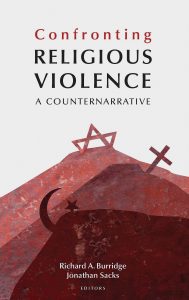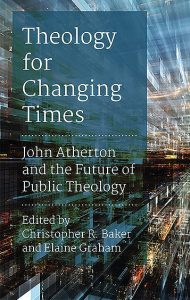Hope in Dark Places
Owned by God
2 Corinthians – a letter of integrity
Confronting Religious Violence
 Confronting
Confronting
Religious Violence
Authors Richard Burridge & Jonathan Sacks (eds.)
Publisher SCM £25
Format hbk
ISBN 9780334057130
The papers in this volume derive from a conference convened in 2017 at King’s College London by Richard Burridge (Dean of KCL) and the former Chief Rabbi, Jonathan Sacks. The book addresses a major issue of our time, namely that of violence committed in the name of religion, and the necessity of developing a counter-narrative to bring about peace and understanding. It stresses the need to develop an appreciation of those whom we consider to be ‘Other’ and of creating an atmosphere of mutual inter-dependence. The contributors, who are drawn from a wide range of academic disciplines (including theology, philosophy, science and law), offer various explanations for religious violence – psychological, political, economic, even climate change and population movement – all of which are worthy of consideration. Case studies and the outline of training courses also offer practical examples of methods of developing mutual understanding. Individual statements often give pause for thought and the whole volume asks the reader to consider what steps are necessary to bring about peace and understanding between groups and individuals whose opinions conflict with our own. The highly academic language of this book will demand the reader’s full attention, but the issues discussed are vital in confronting the religious violence so prevalent in today’s world.
GEOFF BRAMMALL
Peace Studies, Interfaith
Theology for Changing Times
 Theology for
Theology for
Changing Times
Authors Christopher R. Baker & Elaine Graham (eds.)
Publisher SCM £30
Format pbk
ISBN 9780334056959
The book is subtitled ‘John Atherton and the future of public theology’. Atherton, who died in 2016, was for many years at the forefront of the dialogue between religion and public policy, particularly economic policy. He was noted for being one of those rare theologians with a real grasp of modern economic theory and stood out as one who argued for a transformation of capitalism by showing how Christian doctrines such as redemption and reconciliation have much to say about morality in economics. This is in contrast to others such as Stanley Hauerwas who argues from a more radical position that capitalism is inherently flawed, and an alternative should be sought. Atherton was particularly interested in globalisation and its effects on all areas of life, and the importance of involving religion (not just Christianity) in the consideration of what makes for the well-being of humanity as a whole. This book is probably of most interest to students of social ethics, but would also interest anyone concerned with the intersection of theology and public institutions. It contains a number of interesting chapters, all very different, reflecting the breadth of Atherton’s thinking and influence.
MARION GRAY

Recent Comments